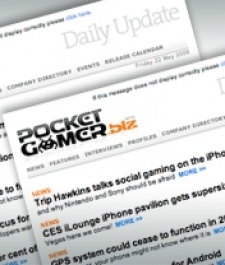Back up to full strength and fully equipped to deal with a particularly polarised seven days in the world of mobile, it was a typically busy week at PG.biz: the home of news and views on the business of app stores, smartphone platforms, developments in mobile game making and assorted technology.
Indeed, while mobile always has a mix of stories of firms doing well standing in contrast to those falling away, this week in particular saw a rush of enthusiasm for up and coming ventures sitting awkwardly next to a rash of for want of a better word failures.
Microsoft naturally dominated the headline thanks to the firm's BUILD 2011 conference in Anaheim, California. It was the wealth of both professional and personal excitement for Windows 8, however, that stood out the most.
There was certainly controversy: news the default version of Internet Explorer 10 on the Metro UI won't support plug-ins, including Flash, could prove to be a watershed moment for web development.
CEO Steve Ballmer also took time to reveal Windows Phone sales to date haven't quite matched up to what Microsoft had been hoping for, but the overwhelming reaction to Windows 8 was undoubtedly a positive one.
A-Live and kicking
It's a response aided by the fact the platform looks to tie Microsoft's greatest strings together in one package.
Windows 8, for instance, will sport Xbox Live support in much the same manner as Windows Phone, and Microsoft's decision to give away 5,000 Windows 8 tablet prototypes from Samsung certainly did it no harm.
Indeed, just hours after the Windows 8 developer preview had been released, half a million folks had clicked on the download button.
But while tablet manufacturers looks to welcome a new, and importantly, stable player, patience is running thin when it comes to two former masters of the portable scene.
RIM, for instance, had a particularly rocky week. The firm's quarterly results saw sales slide by 10 percent to $4.2 billion, with 10.6 million phones and just 200,000 PlayBooks shipped worldwide.
Even before the numbers were public knowledge, commentators had speculated the firm's debut tablet was likely being outshipped by iPad 19 to 1.
It's a series of events that led analyst Horace Dediu to conclude RIM is a force fast fading, with the company now fifth in the smartphone race. The only mystery, he concluded, was why it had taken so long for the dominance of iOS and Android to have an impact on the shipments of BlackBerry handsets.
Hapless handheld
Suffering from Apple and Google's success far earlier on in its lifetime is Nintendo's 3DS, which it's expected will miss its 16 million sales target by 16 percent in 2011, despite the sales boost enjoyed as a result of the device's recent price cut.
Nintendo's response? It most certainly won't be to make smartphones games, according to CEO Satoru Iwata a move that would rob the company of its identity, he claimed.
Instead, the firm unveiled a new slide pad peripheral for the handheld, which met with very little enthusiasm.
At least both RIM and Nintendo are still in the game, however. HP, having dropped TouchPad in August, bizarrely finds itself as the #2 player in the tablet market a position that prompted Canalys to urge HP to reconsider its decision, even if only to sell the TouchPad business on wholesale.
One interested party in webOS, at least - is HTC, which admitted it had "discussed" a possible buyout internally, but said it would "not do it on impulse".
Still, the aftermath from HP's withdrawal continues, with the company offering consumers in major European territories, including the UK, a refund on the difference between the price they paid for a unit and the heavily discounted RRP the tablet ended its life on.
All action Android
Most customers, of course, would prefer HP hadn't thrown in the towel in the first place, refund or not. Indeed, the only legitimate option for any prospective buyers looking to hand their cash to anyone but Apple is Android.
Google's growing strength outside its smartphone portfolio was further highlighted by Sony's decision to unveil its new PS Suite SDK.
The kit will look to encourage Android developers to simultaneously develop for the PlayStation platform, adding to the software libraries of Xperia handsets, Sony's tablets S and P, and the forthcoming PS Vita.
The biggest Android related news, however, came in the form of the departure of OpenFeint co-founder and CEO Jason Citron.
Google's platform has undoubtedly been the network's base since Apple rolled out Game Center on iOS, but Citron has decided to leave to pursue other ventures as parent company GREE looks to integrate the firm further into its own operations.
Arguably more important than all of this even more so than Windows 8's continued storm to launch was the merest hint that iOS 5 is on the horizon. Word suggests the latest version of the platform has 'gone gold' and is winging its way to manufacturers, ready for roll out on the next iPhone in mid-October.
Somehow, even on a quiet week for the company, Apple always manages to have the final say...
PG.biz week that was: Microsoft wins big with Windows 8 as Nintendo takes a knock and RIM gets ribbed for paltry PlayBook shipments
The past seven days' news compressed bite-sized





















